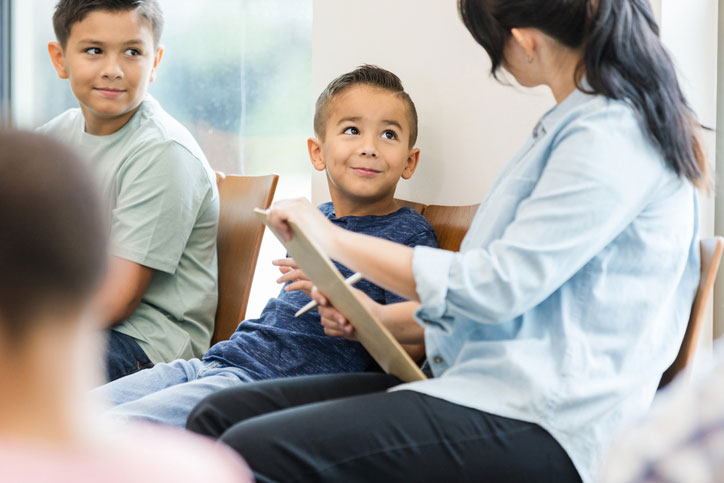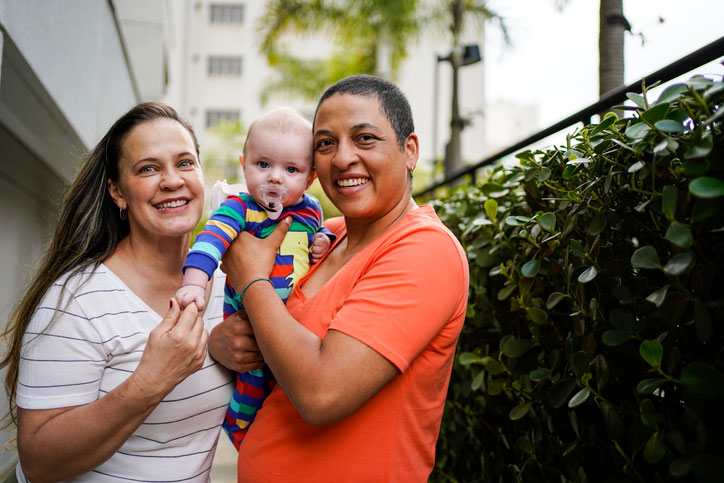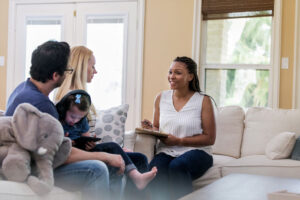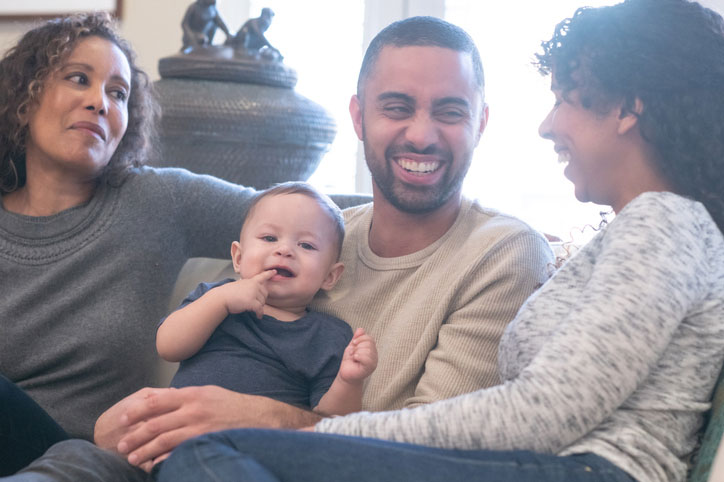Written by Sam Medley

In 2021 alone, over 27,000 children in Florida were the victims of abuse or neglect. But for the state’s child welfare social workers, identifying children in dangerous situations is only one part of a much larger battle.
That same year, almost 250,000 children in the state received monthly visits from a caseworker. Some visits started after a maltreatment investigation. Others began after children entered the foster care system. Still more were initiated after families reached out for help in the midst of desperate situations, a harsh but all too common reality for parents from Miami to the most rural parts of the Panhandle.
If you feel called to aid in any one of these efforts, the Florida child welfare system needs your drive. And by getting some training and education, you can tailor your skill set to any number of important roles.
Florida Department of Children and Families (DCF) is the Last Word on Family Welfare
 Despite its name, child welfare isn’t just about protecting children. It’s about supporting entire families. In Florida, the government agency responsible for all that is the Florida Department of Children and Families (DCF).
Despite its name, child welfare isn’t just about protecting children. It’s about supporting entire families. In Florida, the government agency responsible for all that is the Florida Department of Children and Families (DCF).
The DCF and their local community partners work together to educate parents and connect them with the resources they need to nurture their children. But whether you work for the DCF or a similar organization as a child welfare social worker, you’ll get the chance to:
- Assess family and child needs
- Connect families to resources like child care, behavioral therapy, and affordable medical treatment
- Provide individual counseling to children and parents as well as family counseling
- Coordinate between therapists, teachers, and other professionals involved in child development
- Investigate claims of abuse and neglect
- Help children find safe home placements through adoption, foster care, and other programs when necessary
- Support families and children navigating the foster care or adoption system
- Educate other professionals and community members about the signs of abuse and neglect
- Advocate for children’s rights in court proceedings and custody battles
Of course, not every child welfare social worker is responsible for all of these duties. Some are more focused on investigating abuse and neglect while others specialize in facilitating adoptions.
Child Welfare Jobs You Can Get With a BSW in Florida

Florida’s child welfare system has a lot of moving parts. To give families and children the emergency and long-term help they need, the DCF and other agencies need investigators, case managers, advocates, and more.
Fortunately, you can take on some of the most vital child welfare positions in Florida with a Bachelor of Social Work (BSW).
For some of the more complex roles, you might need a little experience in human services before you get started. But as a BSW student, you’ll complete a fieldwork experience rotation before you graduate that \will prepare you to step into a number of important roles:
Child Welfare Case Manager
Case managers assess families and children and decide what kinds of services they need. They often refer families to healthcare providers and other professionals. Just as importantly, they coordinate care between multiple agencies when a high level of support is needed. You’ll find case managers at child welfare agencies of all kinds.
Child Protective Investigator
When the DCF receives evidence of child abuse or neglect, they send child protective investigators into the field to:
- Observe families and children during in-home visits.
- Interview parents, children, and others who may have information about potential abuse or neglect.
- Facilitate emergency placement when necessary.
- Assess living conditions and decide if children are at-risk.
- Conduct follow-up assessments with children and families.
- Coordinate with emergency services, law enforcement officers, and court officials.
While you can become an investigator with a BSW, this position also typically requires some prior human services experience and certification.
Placement Specialist
Placement specialists work for adoption agencies and foster care services. With the help of child protective case managers, field investigators, and other professionals, they gather information about children who need to be removed from their homes and find them temporary or long-term living arrangements.
Domestic Violence Child Welfare Advocate
When children experience or witness domestic violence, these professionals help them find emergency shelter, medical attention, legal services, and anything else they might need. They often work for domestic violence shelters, nonprofit advocacy groups, and local courts.
The Next Step: Earning an MSW To Advance Your Child Welfare Career in Florida

One of the best things about working in child welfare in Florida is that you can move up through the ranks with experience and a BSW. For example, with those two things, you can become a child protective investigator supervisor for the state and oversee whole teams of investigators.
However, for all clinical counseling roles you’ll need clinical licensure for the legal authority to practice, which starts with a Master of Social Work (MSW). Even more advanced frontline non-clinical positions, employers may call for an MSW and licensure, even if it isn’t necessarily as state-mandated legal requirement. Fortunately, there are specialized MSW programs online and all over the state to help you meet those goals.
A Clinical MSW and an LCSW License are Must-Haves for Assessment and Counseling Children and Families in Florida
Children involved in Florida’s child welfare system often have complex needs. Many need therapy after going through the trauma of abuse and neglect. Others have mental health and behavioral issues that require compassionate, evidence-based intervention.
By becoming a Licensed Clinical Social Worker (LCSW) in Florida, you can give those children the support they deserve.
LCSWs, like counselors and other mental health professionals, can provide therapy for and even diagnose mental health conditions like depression, anxiety, and PTSD. In fact, they’re the only social workers in the state (and most others) legally allowed to do so. To become one in Florida, you’ll have to:
- Earn an MSW
- Take classes on topics like psychopathology and clinical mental health interventions
- Complete two years of supervised clinical practice after graduation
- Pass a standardized exam and apply for a license through the Florida Board of Clinical Social Work, Marriage & Family Therapy and Mental Health Counseling
To prepare for that process, look for MSW programs that offer degree specializations in clinical, direct, or trauma-informed practice. Along with offering classes on topics like cognitive behavioral therapy and trauma-informed counseling, these programs are designed specifically to prepare students for LCSW licensure. Fortunately, clinical degree specializations are available at the vast majority of MSW programs in Florida.
However, as you look for jobs, keep in mind that LCSWs hold a number of different titles in the child welfare system. Sometimes they’re just referred to as LCSWs or child and pediatric social workers. They also frequently work under the title of therapist or counselor. These types of professionals work for every kind of child welfare agency out there.
MSW Degree Specializations for Non-Clinical Administrative and Community-Based Roles
Social workers who specialize in community-based social work at the mezzo level are a huge part of Florida’s child and family safety net. They help lawmakers craft laws that benefit families, oversee parent education initiatives, and bring resources like child immunization programs to underserved communities.
If that sounds like a good use of your talents, becoming a Certified Master Social Worker (CMSW) through the Board is a great way to prepare for your career.
While becoming a CMSW isn’t a legal requirement for becoming a social service administrator in Florida, many employers favor CMSWs because they’ve gone through a rigorous education and training process. It’s similar to the process for LCSWs except you’ll take classes on subjects like welfare program management, community organization, and research.
To prepare for CMSW certification, look for MSW programs that offer advanced generalist, macro social work, and research degree specializations. While not as common as clinical specializations, many MSW programs offer these community- and administration-focused degrees. With that kind of training, you can become a:
- Child protection team manager
- Community education or outreach director
- Child welfare policy analyst
- Foster care coordinator
- Program manager or director
In these positions, you’ll make frontline services accessible by overseeing teams of social workers, managing resources, and building partnerships with other agencies.
Why Get an MSW for Child Welfare? The Answer Comes Through an Understanding of Florida’s Unique Child Welfare System
 As you could probably tell from the number of child welfare positions available to BSW grads, Florida’s social work regulations are a bit more relaxed than what you might see in other states. Unless you want to provide clinical services, state law says you only need a BSW to be a social worker of any kind. The DCF seems to follow that guideline for many of its child welfare positions.
As you could probably tell from the number of child welfare positions available to BSW grads, Florida’s social work regulations are a bit more relaxed than what you might see in other states. Unless you want to provide clinical services, state law says you only need a BSW to be a social worker of any kind. The DCF seems to follow that guideline for many of its child welfare positions.
However, Florida follows a Community-based Care (CBC) child welfare model. This means that in many communities, the DCF relies on local nonprofits and other organizations to support children and families.
For example, the DCF is responsible for carrying out investigations of abuse and neglect. But after an investigation, a local DCF partner is often responsible for providing support, therapy, or finding a suitable home placement.
For new social workers, this means that hiring policies can vary greatly from place to place. One agency might follow the DCF’s minimum requirement of a BSW for most positions. Another might require an MSW for similar positions. Having an MSW can give you more flexibility, especially at later stages of your career.
Professional Certification: Sometimes a Necessity, Sometimes Just a Good Professional Move

Outside of an MSW, there’s another training and education option to consider during your child welfare career in Florida: professional certification.
Professional certifications are credentials that show you’ve gone above and beyond to master specific aspects of child welfare. In Florida, the two major organizations you can get certified through are the National Association of Social Workers (NASW) and the Florida Certification Board.
The NASW offers two certifications for child welfare professionals:
- Certified Children, Youth & Family Social Worker (C-CYFSW): available to social workers with a BSW, one year of post-degree child welfare work experience, and 20 hours of additional training in serving children and families
- Certified Advanced Children, Youth & Family Social Worker (C-ACYFSW): available to social workers with an MSW, two years of post-degree child welfare experience, and 20 hours of population-focused continuing education training.
The NASW is influential on a national level meaning their certifications carry some weight in the social work world even beyond Florida.
The Florida Certification Board has five credentials for child welfare social workers in Florida:
- Certified Child Welfare Protective Investigator
- Certified Child Welfare Case Manager
- Certified Child Welfare Licensing Counselor (for monitoring and assessing foster homes)
- Certified Child Welfare Supervisor
- Guardian Ad Litem Certified Child Advocate Manager (for child court advocates)
Some government child welfare positions (like child protective investigator) require Board certification. Holding or having held these certifications may open doors with non-government employers in the state, as well.
Specific requirements vary, but to earn one, you’ll have to go through a state training program, complete some work experience, be observed in the field, and pass an exam.
What Kind of Organizations Hire Child Welfare Social Workers in Florida?
As you might have guessed from reading over your career and degree options, there’s quite a diverse range of agencies that hire child welfare social workers in Florida. For starters, the DCF employs about 12,000 people alone including child welfare case managers, investigators, foster care specialists, and more.
But with a strong grasp of the developmental, emotional, and day-to-day needs of children and families, you can take your talents to many places in Florida’s social support network.
Outside of the DCF, there are many community-based nonprofits, adoption agencies, foster care services, and other agencies that support children and families in unique ways. The DCF also works with more than a dozen Lead Agencies that are in charge of child welfare programs in different regions of the state.
For example, Camelot Community Care serves around 7,000 families each year by providing behavioral health, family therapy, adoption, foster care, and case management services in 11 communities across the state. And while organizations like the Children’s Home Society of Florida primarily facilitate adoptions and foster care placements, they also partner with primary schools to ensure children’s holistic needs are met.
But no matter where your social work career in Florida takes you, you stand to make the kind of impact that will be felt for generations.
